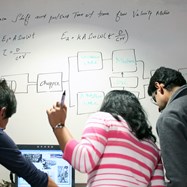Russell Group reports warn UK universities risk falling behind in global race
24 October 2012
Growing global competition means the UK could risk losing its reputation as a higher education powerhouse, the Russell Group of 24 leading universities has warned in a new report today.
A complementary report, The social impact of research conducted in Russell Group universities, outlines the ways in which university research impacts not only on the UK’s economy but also on our wider society, from improving the economy to improving social well-being, quality of life – and of course, the vital pursuit of knowledge.
Jewels in the Crown: the importance and characteristics of the UK’s world-class universities sets out how leading research-intensive universities have the critical mass of research to generate huge impact, link the UK into global knowledge networks, attract investment and exploit technological breakthroughs for economic success.
But the UK punches above its weight when it comes to excellence in research and higher education; we already spend a lower percentage of GDP on higher education than other developed countries.
Dr Wendy Piatt, Director General of the Russell Group, said:
“Our international competitors are pumping billions of pounds into research and higher education and our leading universities are already under-resourced in comparison.
“There is a real danger that overseas universities will not only equal us but will overtake us.
“Of course America and China invest substantial sums in research and higher education. But other countries are also deliberately and consciously concentrating public funding in order to build up a small number of research intensive universities. And we fear their approach will pay dividends.
“University research does not only benefit the economy – however important that may be at the current time. Research, in its many guises, can transform our lives and reach areas we may never have thought of.
“But it can be hard to predict the exact benefits of individual pieces of research and the role of serendipity in scientific discoveries has been shown throughout history. Sometimes, when least expected, the most important discoveries and breakthroughs can be made by talented researchers who were, in fact, trying to prove something else.
“Long-term curiosity-driven research produces the biggest pay-offs in the end which is why sustained investment in research that reaches across discipline boundaries is so important.”
The Jewels in the Crown report highlights examples of concentrated overseas investment by our competitors including:
- Last year China committed £7.2 billion of its education budget towards achieving world-class status for just 100 of its more than 3,000 universities
- By 2017 more than £2 billion will have been invested in Germany’s Excellence Initiative, aiming to create 37 clusters of research excellence and nine excellent universities
- The US has committed to double funding for key basic research agencies
- In France the higher education sector is the centrepiece of stimulus plan, and will receive €11 billion, including the €7.7 billion “Excellence Initiative” (IDEX) to create 10 campuses that bring together leading institutions to compete with the best universities in the world.
- South Korea’s Brain 21 programme is designed to achieve 10 globally competitive research universities. The second phase commenced in 2006, investing 2.3 trillion won (£1.3 billion) to 2012.
The social impact of research conducted in Russell Group universities highlights 45 wide-ranging ways the research at Russell Group universities impacts on our lives: from benefits to business and the economy to tackling global health epidemics, informing good government and understanding our society, making food production more efficient or addressing sectarianism.
It cites case studies including:
- Mathematicians at Cambridge who have developed a practical model that is greatly reducing threats to crops by pests and germs.
- Researchers at Cardiff and Bristol who have shown how young people themselves are the best advocates in helping cut teenage smoking among their classmates.
- Researchers at Liverpool and Nottingham who are developing ground-breaking treatments for malaria, a disease that kills 26,000 infants annually in Kenya alone.
- Glasgow physicists who have helped the chilled foods industry to reduce food waste costs by developing microwave technology that allows less invasive testing procedures.
- Oxford University has developed a remarkable digital archive of the First World War with over 12,000 original items and teaching materials, transforming school history lessons.
- The University of Birmingham’s Policy Commissions have brought together leading figures from the public, private and third sectors together with academics to generate new thinking on contemporary issues of global, national and civic concerns.
This report follows on from an earlier report on the economic impact of research conducted in Russell Group universities which showed that investment in leading research is an indispensable component of the UK’s economic competitiveness and the key to its future growth.
The Russell Group has also launched a new film highlighting the economic, social and environmental impact of spin-outs companies from Russell Group universities.
The two new reports and the film were launched at a dinner which brought together politicians, business leaders and academics. Guests were addressed by the Rt Hon Vince Cable, Secretary of State for Business Innovation and Skills, António Horta-Osório, group chief executive of Lloyds Banking Group and Prof David Eastwood, VC of the University of Birmingham.
-
Hamir Patel
hamir.patel@russellgroup.ac.uk
020 3816 1316
-
Stephanie Smith
020 3816 1310
 X
X


